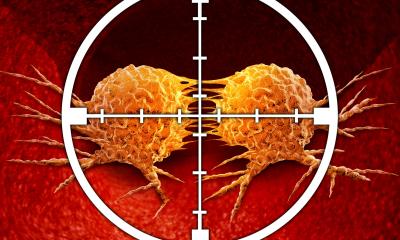iCAGES
New precision medicine tool helps optimize cancer treatment
Columbia University Medical Center (CUMC) researchers have created a computational tool that can rapidly predict which genes are implicated in an individual’s cancer and recommend treatments. It is among the most comprehensive tools of its kind, and the first that incorporates a user-friendly web interface that requires little knowledge of bioinformatics.
The researchers found that integrated CAncer GEnome Score (iCAGES) identified personal cancer “drivers” 77 percent of the time when presented with a pair of randomly chosen driver genes and non-driver genes, compared with about 51 percent for other computational tools.
Most cancers are caused by the accumulation of somatic (versus inherited) genetic mutations, or variants. Many of the variants involved in numerous types of cancer have been identified with genetic sequencing studies of large numbers of patients. However, this information is not always clinically useful on an individual level. Cancer “drivers” can vary from patient to patient, and there are no practical clinical tools for predicting which variants in an individual’s genome are driving his or her disease and which are present but not causing disease. “Even when the genes driving cancer are known, clinicians don’t have an efficient way to choose among the hundreds of possible drug therapies,” said study leader Kai Wang, PhD, associate professor of biomedical informatics and director of clinical informatics at the Institute for Genomic Medicine at CUMC.
To address this shortfall, Dr. Wang and his colleagues developed a computational tool called iCAGES. First, iCAGES analyzes the patient’s entire genome, comparing it to the genomic sequence of the patient’s tumor to identify possible cancer-causing variants. Next, iCAGES cross-references these variants to databases of known cancer-causing genes, using statistical analyses and machine learning techniques to prioritize the most likely driver genes. Finally, iCAGES matches the variants to FDA-approved and experimental drug therapies that specifically address those variants or genes. The entire process takes about 30 minutes. In contrast, conventional approaches require many separate steps involving human input, taking as long as several weeks.
In a test designed to show how the tool would be used in actual practice, Dr. Wang retrospectively tested iCAGES using detailed sequencing data from a patient with lung cancer. Out of 129 possible cancer drivers, iCAGES focused on a gene called ARAF. iCAGES used the genomic sequencing data to select sorafenib as the top drug candidate out of 122 possible treatments. The patient’s oncologists had reached the same conclusions, but they used a much more complex and time-consuming approach, involving expert knowledge throughout the decision-making process. “The patient was given sorafenib and had an extraordinary clinical response,” said Dr. Wang. “It’s worth noting that sorafenib is not FDA-approved for this indication. Nonetheless, the result suggests that iCAGES may help to identify novel treatment strategies and off-label use of existing approved drugs.”
When tested on various cancer patient databases, iCAGES was found to be superior to other computational tools at predicting cancer drivers from personal genomes and at identifying beneficial treatment. “We hope that iCAGES can help clinicians take full advantage of the massive amounts of data on genomic sequencing and cancer variants, and shed light on personalized cancer therapy,” said Dr. Wang.
Source: Columbia University Medical Center
04.01.2017





